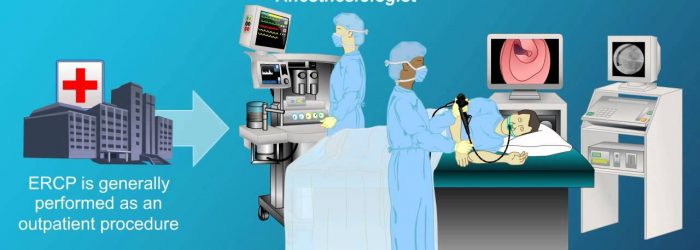
ERCP (Endoscopic retrograde cholangiopancreatography) is a medical procedure used to examine the pancreatic and bile ducts.
An endoscope about the thickness of index finger is placed into stomach and duodenum (small intestine) through the mouth.
In the duodenum, a little opening is recognized (ampulla) and a little plastic cylinder (cannula) is gone through the endoscope and into this opening.
Dye is infused and X-rays are taken to think about the conduits of the pancreas and liver.
ERCP is performed to diagnose and treat conditions of the pancreas or bile ducts. Also, to clarify unusual results from blood tests, ultrasound or CT scan.
The common uses of ERCP include abdominal pain, weight loss, or ultrasound or CT scan shows stones or a mass in pancreas and bile ducts.
Following precautions must be fulfilled before ERCP
The patient’s throat is sprayed with an anesthetic before the test begins to numb the throat and prevent gagging and given medication intravenously to help the patient relax during the examination.
While lying on an X-ray table, an endoscope is passed through the mouth, down to esophagus, and into stomach and duodenum.
The procedure usually takes an hour, but this may be long. The endoscope does not interfere with breathing.
As X-ray material is injected into the pancreatic or bile ducts, the patient may feel some minor discomfort.
The patient is monitored in the endoscopy area for 1-2 hours until the effects of the sedatives have gone.
The throat may be sore for a day or two. The patients will be able to resume their diet and take routine medication after leaving the endoscopy area unless instructed otherwise by the physician.
Results may take some time to compile and one should take them from the test facility.
ERCP is safe as it is performed by trained and experienced physicians at Islamabad Gastroenterology Associates facility.
Complications are rare, however, they can occur. Following are the common and uncommon complications that may occur.
© Islamabad Gastroenterology Associates, All Rights Reserved Powered By AKITS
Disclaimer: This website’s content is for educational purposes only and should not replace professional medical advice or treatment. We are not liable for the accuracy, completeness, or timeliness of the information, nor for any actions taken based on it.